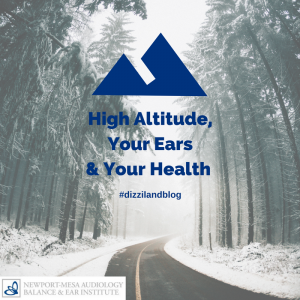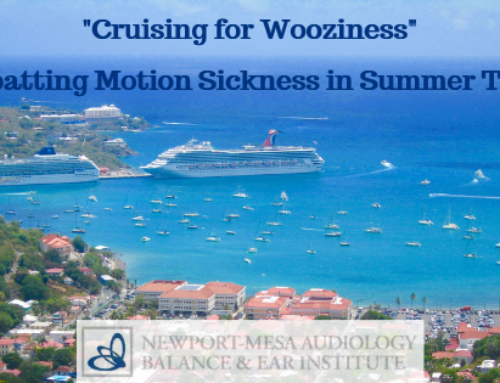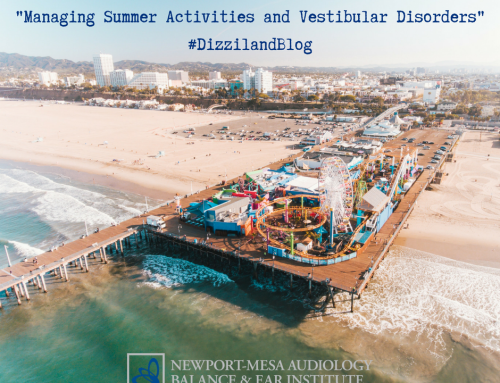
By Jennifer Grace, Au.D. and Director of Clinical Management & Treatment
We are still immersed in the winter season, so people will continue to travel to the mountains for fun in the snow. Spending time with friends or family on or off the slopes is the perfect way to relax and escape the grind.
Unfortunately, high altitude can affect your ears and overall health profoundly. If you’re traveling from areas at sea level to elevations above 8,000 feet, you may experience ‘ear barotrauma’ and/or altitude sickness. At best, it can be uncomfortable and limit your ability to enjoy mountain life and at worst, become a threat to your health.
Ear barotrauma is caused by air pressure changes at higher elevations and results in discomfort and pain in the ear(s). The eustachian tube connects the middle of your ear to your nose and throat, in addition to helping to regulate your ear pressure and it may become blocked.
Ear barotrauma symptoms may include dizziness, hearing difficulty and fullness in the ear. If it progresses to severity, the symptoms may intensify to pain, nosebleeds and ear drum injury. However, it’s usually temporary, reversible and will go away on its own. Yawning, chewing gum, breathing exercises and antihistamines will help alleviate it, but if the pain continues, you should consult with a doctor to rule out an ear infection. You also don’t want to suffer a ruptured ear drum, which can take up to two months to heal.
Vertigo can also be a symptom of severe or prolonged ear barotrauma. It can make you dizzy and induce nausea and vomiting. When barotrauma causes vertigo, this can indicate damage to the inner ear and may be associated with hearing loss.
In addition to your ears, high altitude can affect your overall health. As altitude increases, the air becomes thinner and less oxygen-saturated. The higher you climb, the lower the air pressure and oxygen level gets. If your body doesn’t acclimate to high elevations, you may also experience altitude sickness. Altitude sickness is most common at elevations above 8,000 feet.
According to the Mayo Clinic, 20 percent of hikers, skiers, and adventurers traveling to high elevations between 8,000 and 18,000 feet experience altitude sickness. The number increases to 50 percent at elevations above 18,000 feet. Our bodies can better handle the shift by adjusting to higher elevations gradually. You’re at a higher risk of developing altitude sickness if you ascend rapidly – more than 1,600 feet per day.
Mild symptoms of altitude sickness may include headache, insomnia, nausea, dizziness, vomiting, fatigue, shortness of breath, accelerated heartbeat, malaise, loss of appetite to name a few. More severe case of altitude sickness has more profound symptoms and requires medical attention, especially if you have incessant coughing, tightness or congestion of your chest, inability to catch your breath, feeling off balance, double vision, confusion or a change of skin color (more pale, grey or bluish). Complications of altitude sickness include pulmonary edema (fluid in the lungs), brain swelling, coma and death.
I recommend these top two tips for your health at high altitudes:
- Ascend slowly – if you’re prone to altitude-related issues, give yourself some lengthy pit stops or breaks as you ascend to your high-altitude destination if possible. This will give your body and system time to adjust.
- Pre-hydrate and stay hydrated – optimally, you want to arrive at your destination well-hydrated. This also means avoiding beverages that might dehydrate you such as caffeine and alcoholic drinks and making sure you drink plenty of water before you arrive.
Other altitude sickness prevention recommendations include:
- Carb Load – eat frequent, small meals, especially food high in carbohydrates and low in fat and protein. You need more calories at higher elevation, especially whole grains.
- Chill Out – make sure you don’t exert too much energy right away, avoiding strenuous exercise. Take it easy until you’ve had a chance to acclimate.
- Sleep Low – your blood oxygen levels are the lowest when you’re sleeping at high elevations. If possible, plan your nighttime accommodations to be at a lower altitude than your daytime, higher elevation activities.
When traveling to the mountains, if you start to experience debilitating symptoms of altitude sickness, take steps to minimize the effects, such as moving to a lower elevation. Also, beware of gimmicky cures such as oxygen shots and herbal supplements sold at tourist destinations.
If you’re heading to higher altitudes, keep these tips in mind. We hope you remain healthy and safe throughout the remainder of the winter season!





Leave A Comment